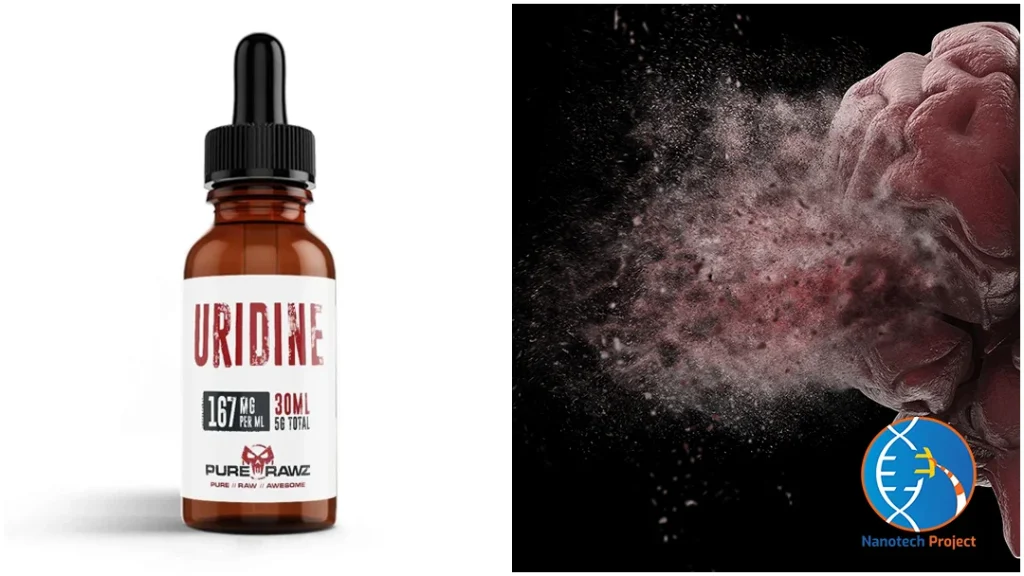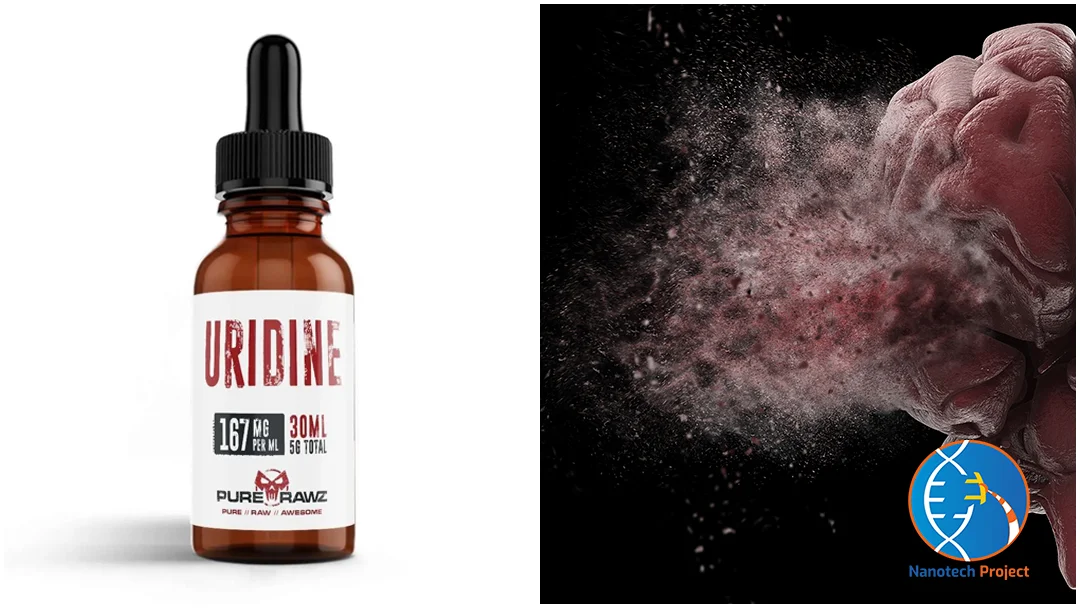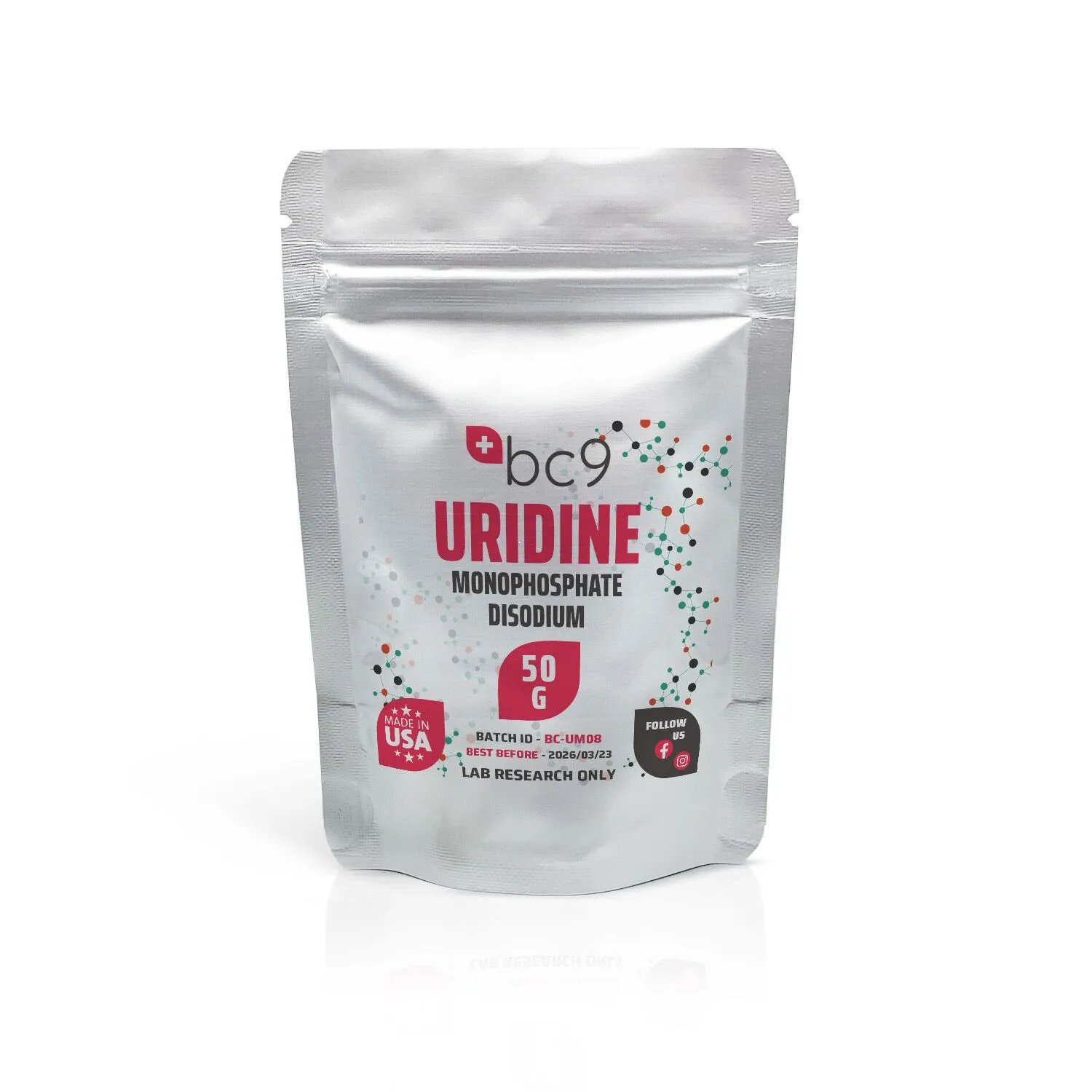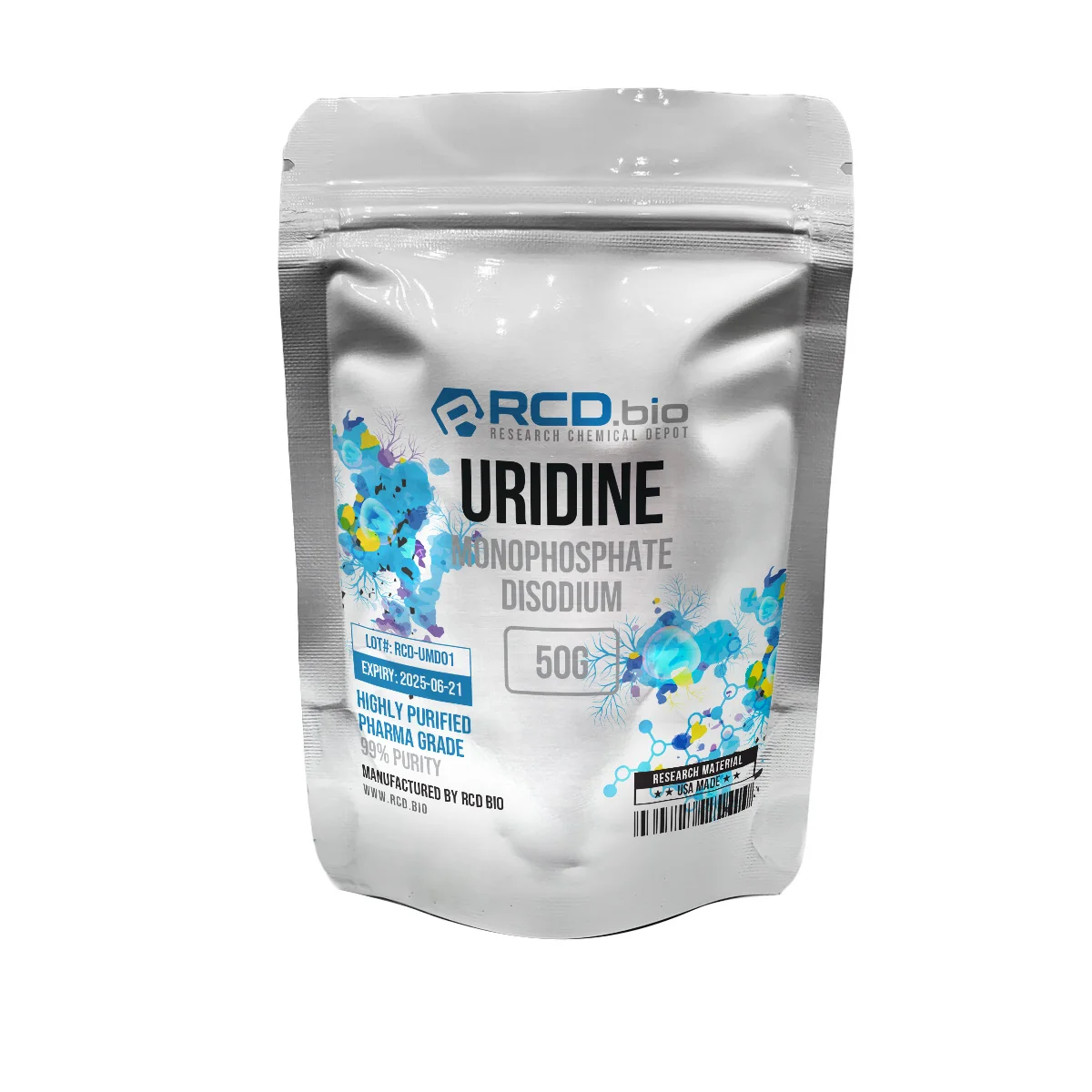Uridine was first discovered in 2005. It is one of four major building blocks of RNA (Ribonucleic acid). RNA is responsible for creating proteins in the body. It also stores genetic info of viruses, a property that scientists exploited to create anti-COVID-19 vaccines.
When it isn’t playing its part in saving humanity from a once-in-a-century pandemic, Uridine is busy improving our mood, protecting our brain from various disorders, and synaptic protein synthesis. It also fights depression, boosts memory, and enhances the quality of sleep.
The benefits of Uridine aren’t limited to adults. Babies, too, benefit from this nucleotide. Scientists have discovered that infant baby formulas and human breast milk contain Uridine. They claim that’s because Uridine monophosphate promotes relaxation and helps the little one doze off.
In this article, we’re going to discuss everything about Uridine Monophosphate. We’ll kick things off by discussing what this nucleotide is and how it works. Next, we’ll focus on its benefits, dosage, and side effects. Finally, we’ll answer questions most people have about Uridine monophosphate.
What Is Uridine Monophosphate?

Uridine Monophosphate is a pyrimidine nucleoside. It is found in all living organisms and occurs abundantly in nature as well. Goat’s and sheep’s milk, organ meats, sugarcane extract, tomatoes, and broccoli are some of the natural Uridine sources.
However, as readily available as the dietary Uridine sources are, they suffer from one problem. Most of the dietary Uridine is incapable of crossing the blood brain barrier since the liver breaks it down. That is a scenario you can avoid by taking Uridine monophosphate.
Various human studies have shown why you may want to do that. This nucleic acid has been shown to enhance memory and cognition. It also eases depression and bipolar disorder symptoms, lowers nerve pain and inflammation, and is needed for healthy cell membranes.
Uridine has also been proven to improve symptoms of specific lung diseases. At least one human study has found that it could reverse some of the damage caused by HIV in patients. On top of everything else, it might also treat dry eye syndrome and mild cognitive impairment.
Overview of Benefits and Side Effects
Before turning our attention to what experts have to say about Uridine Monophosphate, let’s have an overview of its benefits and side effects.
Benefits
- Improves Cognitive Function
- Enhances Attention And Focus
- Helps You Fight Depression
- Might Prevent Alzheimer’s
Side Effects
- Headache
- Nervousness
- Fever (At Very High Doses)
Stacking Uridine with a choline supplement would keep side effects at bay.
How Does Uridine Monophosphate Work?

Uridine Monophosphate has the following mechanisms of action:
1) Increases CDP Choline Levels
CDP choline (cytidine diphosphate-choline) is an intermediate in the production of phospholipids. Phospholipids are critical components of the cell and cellular membranes. They give structure to the cell to protect it and maintain healthy and robust brain tissue.
CDP choline also plays a crucial role in synthesizing phosphatidylcholine (PC). PC, in turn, is a precursor of acetylcholine, the neurotransmitter that improves cognitive functions. Acetylcholine also induces synaptic plasticity (exchange of info between neurons) that is crucial for memory.
2) Boosts Dopamine Release
Dopamine is one of the most well-known neurotransmitters. And rightly so. This brain chemical regulates your sleep patterns as well as your mood, learning ability, digestion, and memory. It also makes you feel good whenever you engage in a pleasurable activity.
An animal study has found that dietary urine enhances dopamine release in the brain, potentially providing you with all the benefits mentioned in the previous paragraph. Aside from those, dopamine also has an impact on your sex drive.
3) Enhances Neurites Growth
Neurites help neurons form connections with each other. There are two types of neurites, including axon and dendrite. The growth of both these types (neurite outgrowth) is essential for the development and regeneration of the nervous system.
An analysis has revealed that dietary Uridine enhances neurite outgrowth within four days of treatment. Researchers who conducted the analysis claim that the increase in neurite growth was ‘significant’. They also found that it was ‘dose dependent’.
4) Activates P2Y2 Receptors
P2Y2 receptors are responsible for increasing the release of three substances. These include acetylcholine (benefits mentioned above), prostaglandins (lipids that help tissues heal from injury and illness), and nitric oxide (which plays a crucial role in learning and memory processes in the brain).
However, despite their importance, not many nootropics target P2Y2 receptors. Uridine Monophosphate is different. An animal study suggests that this supplement activates P2Y2 receptors in the brain, potentially providing you with multiple benefits.
Uridine Monophosphate Benefits
Uridine Monophosphate offers various cognitive and physical benefits. It enhances memory and learning ability, boosts alertness and focus, and improves mood. This substance could also come across as a neuroprotector by fighting depression and bipolar disorder symptoms.
When used together with choline, Uridine can improve blood flow, helping people with high blood pressure or hypertension. A combination of Uridine, choline, and DHA, meanwhile, was linked to addressing one of the major causes of dementia.
Here are the major benefits of Uridine Monophosphate:
- Improves Memory And Learning
- Enhances Attention And Focus
- Fights Depression And Bipolar Disorder
- Can Improve Brain Function
- Might Prevent Alzheimer’s
Let’s discuss these benefits in detail.
1) Improves Memory and Learning
Various studies have shown that Uridine supplementation could improve multiple cognitive functions. An animal study found that gerbils who were administered dietary Uridine alongside DHA experienced ‘significant’ improvements in memory and learning.
A human study has reached the same conclusion. Researchers conducting the study were curious to find the effects of Uridine administration on the central nervous system. The study helped them conclude that this substance improves memory and boosts neuronal plasticity.
2) Enhances Attention and Focus
A 3-month study has found that Uridine improves attention and focus. The study involved 30 older adults with ages 60 and above. All of them had difficulty recalling things from the past. Each of them was observed before, during, and after the trial to understand the drug’s effects.
As it turned out, Uridine didn’t only enhance attention and focus. It also improved the older adults’ executive functions and mental flexibility. Their vital signs, too, got a shot in the arm. This shows that Uridine could bring about an overall improvement in cognitive performance.
3) Fights Depression and Bipolar Disorder
An estimate puts major depressive disorder (MDD) as the leading cause of disability for people ages 15 to 43. The statistics about bipolar disorder are equally distressing. The National Institute of Mental Health states that bipolar disorder diagnoses have become more common of late.
That’s where the bad news ends. A 2011 study confirmed that Uridine could fight depression and bipolar disorder in both adults and adolescents. It reduces the effects of cortisol (‘stress hormone’) by transforming into phospholipids (known cortisol inhibitors) in the brain.
Sulbutiamine is another nootropic that could fight depression. A study found that a daily dosage of 400 mg reduced anxiety and depression symptoms in 75% of the subjects. The participants experienced improved symptoms after taking this supplement only for a month.
4) Can Improve Brain Function
An animal study suggests that when taken together with choline, Uridine could improve several brain functions. The administration of both these supplements enhanced spatial learning and selective attention in the participants. Keep in mind that the subjects were all hypertensive.
People with hypertension or high blood pressure are at an added risk of mild cognitive impairment. Hypertension can reduce the blood flowing toward and within the brain (cerebral blood flow). It can also cause blood brain barrier dysfunction, one of the causes of Alzheimer’s disease.
5) Might Prevent Alzheimer’s Disease
Alzheimer’s disease is one of the most prevalent types of dementia. In the US alone, more than 5.8 million people aged 65 years or old had this disease in 2020. Half of them had mild Alzheimer’s disease, over 30% had moderate AD, and 19.3 had a severe form of AD.
Researchers state that optimal levels of three chemicals in the brain cells (Uridine, DHA, Choline) are crucial for keeping Alzheimer’s disease at bay. That is true for persons who already have AD – high levels of Uridine, DHA, and choline can correct AD-related deficiencies in the brain.
6) Might Slow Age-Related Cognitive Decline
Neuroplasticity is the brain’s vanguard against diseases of aging. It refers to the brain’s ability to remember, learn, and adapt by creating and recognizing connections. Aging reduces neuroplasticity by decreasing the junctions at which neurotransmitters exchange info with the body and brain.
One study has shown that the combination of Uridine, DHA, and Choline could not only reduce the rate of synaptic decay. But it could also activate mechanisms that give birth to new brain synapses. As a result, this trio of nutrients could slow (or maybe even prevent) age-related cognitive decline.
7) Eases Pain and Inflammation
Uridine possesses powerful anti-inflammatory properties. An animal study researching its effects on arthritis referred to Uridine as a potential ‘preventive’ or ‘therapeutic’ candidate for the disease’s treatment. Another concluded that Uridine could treat pulmonary fibrosis.
Uridine’s anti-inflammatory effects have been proven in a human study, too. Seventy-five back-pain patients were administered a combination of Uridine triphosphate, cytidine, and vitamin B12 for 60 days. Ninety-nine percent of them had experienced pain relief by the time the trial concluded.
8) Might Treat Dry Eye Syndrome
Dry eye syndrome affects an estimated two out of 10 adults. Its symptoms include inflammation of the eye surface and low production of tears. People who have dry eye syndrome experience burning or stinging sensations in the eyes. If untreated, it can hurt the quality of life.
In a clinical trial, oral Uridine has shown promise to be an effective dry eye treatment. Oral Uridine effectively restored the tears’ production in people with dry eyes. More research, however, is needed before one can back Uridine’s use for improving or treating dry eye syndrome.
Uridine Monophosphate Dosage
It’s suggested to take 150 – 250 mg Uridine Monophosphate UMP per day.
Most users suggest stacking Uridine Monophosphate with DHD (found in fish oil), folic acid, and a choline source (Alpha GPC). All these substances potentiate the others’ effects when mixed. Alpha GPC will keep headaches, one of Uridine Monophosphate’s side effects, at bay.
You can take Uridine with or without food. Try taking it earlier in the day. Pregnant, breastfeeding, or nursing women should consult their doctor before taking Uridine. You might also want to get medical advice if you’re taking other medications or supplements.
Uridine Monophosphate Side Effects

There’s a minimal risk of side effects when taking Uridine Monophosphate. That is true as long as you stick to the recommended dosage amount. That’s because Uridine is already present in your body. So your system should be able to tolerate it.
Having said that, a few users report experiencing mild and fleeting side effects. These include headache, nervousness, acidic stomach, fatigue, and nausea. Uridine might also cause diarrhea and fever when taken in extremely high doses, giving you an indication to lower the dosage.
Take a choline supplement like Alpha GPC to reduce the risk of headaches. Headaches occur because Uridine might lower choline levels in your brain. A choline supplement will redress the shortage, keeping this unwanted side effect at bay.
Uridine Monophosphate Stacks
Most of the sought-after benefits that Uridine Monophosphate offers – slowing age-related cognitive decline, improving cognition and memory, reducing pain and inflammation – is when you decide to mix it with other supplements.
Here are the most well-known Uridine Monophosphate stacks:
a) Uridine Alpha GPC DHA Stack – For Slowing Age-Related Cognitive Decline
If you want to slow down age-related cognitive decline, consider taking Uridine Monophosphate with DHA (fish oil) and Alpha GPC/choline. A trial involving patients with Alzheimer’s disease found this combo to be highly effective in slowing brain atrophy and improving cognition.
b) Uridine DHA Stack – For Improving Mood
If you’re dealing with anxiety or depression, combining Uridine Monophosphate with omega-3 fatty acids (DHA) might cheer you up. Animal studies have shown that both these substances not only reduce depression when taken together. They also potentiate the other’s effects.
c) Uridine Vitamin B 12 Alpha GPC Stack – For Reducing Pain and Inflammation
If you are dealing with any kind of pain, it’s recommended that you stack Uridine with vitamin B 12 and alpha GPC. A double-blind controlled trial found this combination effective in reducing lower back pain. Almost all of the trial’s participants (99%) experienced pain relief.
d) Uridine DHA Choline Stack – For Improving Memory and Learning
Consider mixing dietary Uridine with DHA and choline if you wish to give your memory and learning power a shot in the arm. Animal studies have found this combination to be highly potent in boosting memory and learning capacity.
Where to Buy Uridine Monophosphate?
If you are looking for high-quality uridine monophosphate product, below are the recommended online vendors:
| Vendor | Rating | Buying Link | Verdict |
|---|---|---|---|
| PureRawz | 4.8/5 | Buy Uridine Monophosphate Disodium from PureRawz | High-quality, trusted vendor |
| RCDBio.co | 4.7/5 | Buy Uridine Monophosphate Disodium Powder from RCD Bio | Pure powder form, excellent reputation |
Summary
Dietary Uridine Monophosphate offers various benefits to your mental and physical health. This nucleoside can cross the blood brain barrier (something which its natural counterpart can’t do). It can improve your learning capacity, cognition functions, and memory.
It can also improve your focus and attention, elevate your mood and reduce nerve pain. Various studies have linked it to the prevention of Alzheimer’s disease. And at least one human clinical trial has found Uridine Monophosphate as an effective treatment for dry eye syndrome.
If you’ve liked what you just read, it’s suggested you buy Uridine Monophosphate from Pure Rawz.
You’ll get a 30-day moneyback guarantee, 100% satisfaction guarantee, and publicly available lab reports to verify the supplement’s safety and effectiveness.











